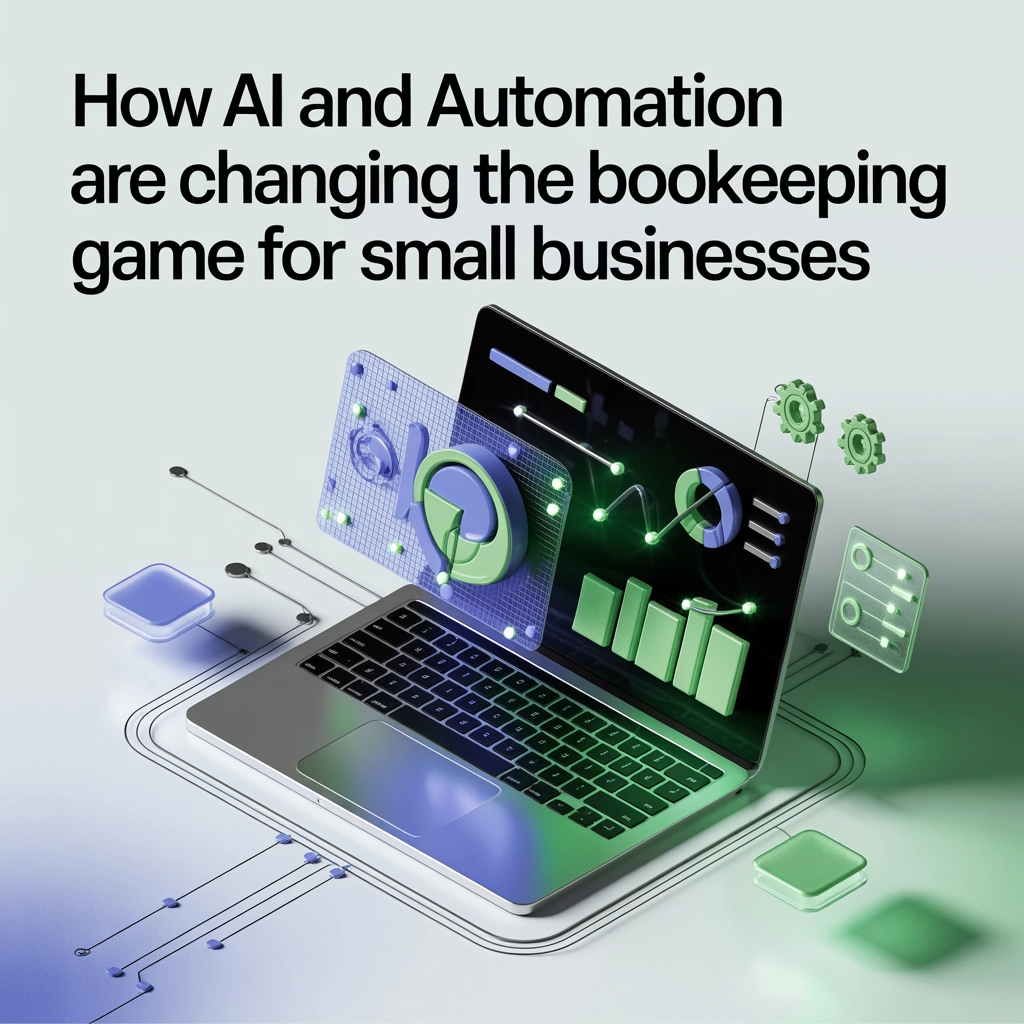How AI and Automation Are Changing the Bookkeeping Game for Small Businesses

The Bookkeeping Revolution Is Here
Remember when bookkeeping meant mountains of paperwork, tedious data entry, and endless hours spent reconciling accounts? Those days are rapidly becoming history. Artificial intelligence (AI) and automation are fundamentally transforming how small businesses handle their finances, turning what was once a necessary evil into a strategic advantage.
At Bookkeeping Made Simple, we've witnessed this transformation firsthand. Today's bookkeeping isn't just about recording transactions – it's about leveraging technology to gain insights, save time, and make better business decisions.
The Small Business Bookkeeping Challenge
Small business owners have traditionally faced significant hurdles when it comes to bookkeeping:
Time drain: On average, small business owners spend 5-20 hours per month on bookkeeping tasks
Error-prone processes: Manual data entry leads to mistakes that can cost businesses thousands
Delayed insights: Month-end closings mean decisions are based on outdated information
Compliance headaches: Keeping up with changing tax regulations requires constant vigilance
Resource limitations: Hiring full-time accounting staff is often beyond budget constraints
The good news? AI and automation address all these challenges – and more.

How AI Is Transforming Bookkeeping
1. Automated Data Capture and Entry
Gone are the days of manually typing every receipt and invoice into your accounting system. Today's AI-powered tools can:
Scan receipts and automatically extract relevant data
Categorize transactions based on historical patterns
Pull information directly from digital invoices into your bookkeeping software
Connect to bank feeds for real-time transaction synchronization
This automation alone can reduce data entry time by 80-90%, virtually eliminating one of the most time-consuming aspects of traditional bookkeeping.
2. Intelligent Transaction Categorization
Modern AI doesn't just record transactions – it understands them. Machine learning algorithms can:
Learn your business's spending patterns
Automatically categorize transactions with increasing accuracy over time
Flag unusual transactions that don't fit established patterns
Suggest tax deduction opportunities based on transaction data
As these systems learn, they become increasingly accurate, often surpassing human accuracy while working thousands of times faster.
3. Real-Time Financial Insights
Perhaps the most game-changing aspect of AI-powered bookkeeping is the shift from retrospective to real-time financial visibility:
Dashboard views of current cash position
Daily profit and loss updates instead of monthly statements
Automated cash flow forecasting based on receivables and payables
Instant visibility into business performance metrics
This real-time insight transforms bookkeeping from a record-keeping function to a decision-support system that helps you navigate your business with precision.
The Tangible Benefits for Small Businesses
Time Savings That Matter
Our clients at Bookkeeping Made Simple consistently report significant time savings after implementing AI-powered bookkeeping solutions:
5-20 hours per month reclaimed from manual bookkeeping tasks
75% reduction in time spent on monthly reconciliations
90% decrease in data entry requirements
This recovered time allows business owners to focus on growth activities instead of administrative tasks.
Enhanced Accuracy and Reduced Errors
AI systems drastically reduce common bookkeeping errors:
Elimination of manual data entry mistakes
Consistent application of accounting rules
Automated reconciliation processes that catch discrepancies
Reduction in duplicate transactions and payments
These improvements translate directly to more reliable financial statements and better business decisions.

Cost Reduction and ROI
The financial case for AI-powered bookkeeping is compelling:
Lower bookkeeping costs compared to traditional services
Reduced need for accounting staff time
Fewer costly accounting errors and their consequences
Tax savings through better expense tracking and deduction identification
Improved cash flow management reducing interest and late payment fees
Most small businesses see a positive ROI within months of implementing these solutions.
Advanced Capabilities Changing the Game
Predictive Analytics and Forecasting
Modern bookkeeping isn't just about recording what happened – it's about predicting what will happen:
Cash flow forecasting based on historical patterns and upcoming transactions
Revenue projections using trend analysis
Expense predictions that help with budgeting
Early warning systems for potential financial issues
These predictive capabilities transform bookkeeping from a backward-looking necessity to a forward-looking strategic tool.
Fraud Detection and Prevention
AI-powered systems add a layer of security that traditional bookkeeping simply can't match:
Identification of unusual spending patterns
Detection of duplicate payments
Flagging of suspicious transactions
Monitoring for compliance issues
For small businesses, where fraud can be devastating, these protections offer significant peace of mind. Learn more about how technology helps in preventing fraud in your business.
Seamless Integration with Business Operations
Today's AI bookkeeping solutions don't exist in isolation – they connect with your entire business ecosystem:
Integration with point-of-sale systems
Synchronization with e-commerce platforms
Connection to CRM systems for customer financial insights
Linkage with inventory management for cost analysis
This integration provides a holistic view of your business that was previously available only to large enterprises with sophisticated ERP systems.

Implementing AI Bookkeeping in Your Small Business
Getting Started Without the Headaches
Transitioning to AI-powered bookkeeping doesn't have to be complicated. Here's a simplified approach:
Assess your current pain points: Identify which bookkeeping tasks consume the most time or create the most headaches
Start with core functionality: Begin with basic automation of data entry and categorization before moving to advanced features
Choose cloud-based solutions: These offer the easiest implementation and ongoing updates
Work with experienced partners: Professional guidance ensures you maximize the benefits while minimizing disruption
At Bookkeeping Made Simple, we guide businesses through this transition with a focus on practical, immediate benefits rather than technological complexity.
Finding the Right Balance of Human and AI
The most effective approach isn't about replacing humans with AI – it's about creating the perfect partnership:
AI handles repetitive, data-intensive tasks
Human bookkeepers focus on analysis, strategy, and relationship building
Technology identifies patterns and anomalies
Professionals interpret those findings in business context
This human-AI collaboration delivers results neither could achieve alone.
The Future of AI in Bookkeeping
The evolution of AI bookkeeping isn't slowing down. Here's what's on the horizon:
Conversational interfaces: Ask your bookkeeping system questions in plain English and get immediate answers
Advanced predictive modeling: More sophisticated forecasting of complex financial scenarios
Autonomous reconciliation: Complete month-end processes with minimal human involvement
Blockchain integration: Enhanced security and streamlined audit processes
As these technologies mature, the gap between businesses that adopt them and those that don't will only widen.
Embracing the AI Bookkeeping Advantage
The shift to AI-powered bookkeeping represents more than just technological advancement – it's a fundamental change in how businesses understand and manage their finances. Small businesses that embrace these tools gain:
The financial visibility previously available only to large corporations
Time and resources to focus on growth rather than administration
Data-driven insights that improve decision-making
Competitive advantages through better financial management
At Bookkeeping Made Simple, we believe that every small business deserves these advantages. Our approach combines cutting-edge technology with human expertise to deliver bookkeeping that's not just easier – it's smarter.
Ready to transform your bookkeeping from a burden into a strategic asset? Contact us today to learn how AI-powered bookkeeping can work for your business.
The future of bookkeeping isn't just about keeping books – it's about keeping your business ahead of the curve. And that future is already here.
